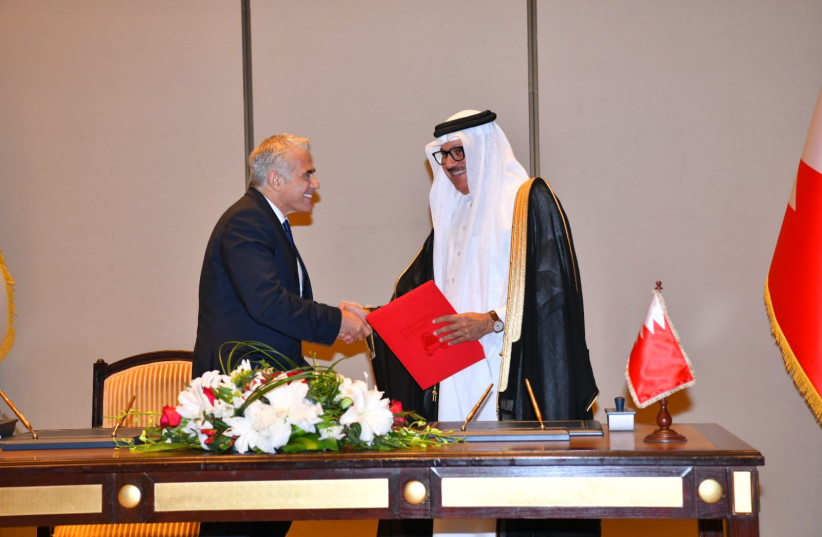The first anniversary of the Abraham Accords has just been marked. For many, it has been a celebratory occasion.
Certainly, the decision by the United Arab Emirates and Bahrain, the first two Arab countries to forge the US-brokered agreement with the Jewish state, was monumental. And after they broke the proverbial ice, Morocco and Sudan, too, chose membership in this new club.
But what kind of club is it?
The term “peace treaty” has been bandied about in conversations and in speeches and in media coverage of the accords. But the Abraham Accords, with its importance and history as an agreement, is not a peace treaty. That needs to be clear.
Think “business deal” instead.

More than anything else, the Abraham Accords is a business deal. A business deal between countries that never before entered into business deals – at least not openly and in full public view. For the Arab partners, this business deal brokered by and for businesspeople who also happen, or happened, to be senior representatives of their respective countries.
Business is crucially important to a country. And business between Israel and Arab countries in the region – like UAE, Bahrain, Morocco, Sudan and the others waiting in the wings for the right time to forge a relationship with Israel – has tremendous potential.
These are markets and investors that Israel should tap and exploit. These deals will open markets for Israel. And Israel will be a boon for them. These countries are smart enough to realize that – and secure enough in their standing in the Arab world. And they are eager to invest in Israeli technology and start-ups and other emerging Israeli ventures.
Aside from business and growth within Israel, travel loving Israelis have gained new and exciting and formerly verboten vacation destinations.
As much as Israel is exploiting these new opportunities, so too have these Arab businesspeople and leaders. They are taking as much advantage of the new opportunities as they can.
But do not be deceived.
These deals have not transformed the Middle East. Mainstream attitude in these countries toward the West, especially the US and Israel, has not changed. The long-held and ingrained attitudes toward Israel, attitudes of the residents of these countries that have signed on to the accords, have not changed. Not one whit, not one iota.
Israelis have a soft spot for countries that recognize and accept them. For the longest time, so few countries did. While this is a welcome change, Israel must not fall into the same self-deception hole that the US inevitably and always falls into. Doing so is a costly mistake.
Few values are shared between Israel and these nations. The most glaring are the values called freedom and equality. And while one might argue that Islam and Judaism are more similar than Christianity and Judaism, that is correct in theory only. Not in practice.
In the West, Christianity and Judaism and now Islam live side-by-side. Not so in Muslim lands. US thinkers and decision-makers do not understand this distinction.

There was never a religious reformation in Islam. The Islam of the West is not the Islam of Islamic societies. In the West, Islam mimics Judaism and Christianity. Leaders and adherents blend Islamic tradition and values and live in a modern society with post reform values like equality.
Not understanding that results in cataclysmic mistakes and failure. Like the US’ abysmal decision making in Afghanistan.
The leaders with whom Israel signed Accords, the investors and business partners with whom they are entering into deals, do not represent the masses. These are people who are not dumbstruck and offended when they encounter women in modern dress, women in boardrooms, women in positions of power. Unlike in Israel, there will be very little trickle down of the benefits of the accords to the masses of Arab country signees.
This is not hypothetical thinking. It’s facts on the ground. While Foreign Minister Yair Lapid was on an official visit to Manama, Bahrain, there were mass protests on the streets of the capital. 240 Muslim clerics signed a statement rejecting normalization with Israel. They went so far as to call Israel, their new partner, the “Zionist enemy.” Shi’ites and Sunnis, tribal enemies united only in their hatred for Israel, protested the opening of an Israeli Embassy in their country.
The masses and their leaders most definitely do not see eye to eye.
Celebrate, if you will. But do not celebrate a new dawn, a new awakening. Do not celebrate peace treaties. These are accords, They are business deals. The Arab world has never confused the two – and neither should Israel.
